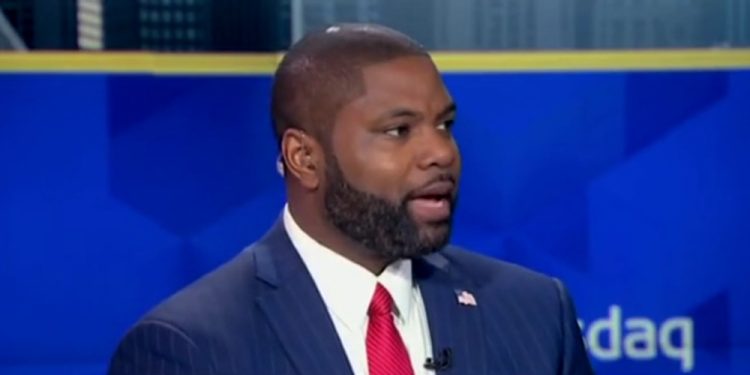- Watch The JD Rucker Show every day to be truly informed.

(DCNF)—Republican Florida Rep. Byron Donalds got into a near shouting match with CNBC host Andrew Ross Sorkin Monday as they debated Republican nominee Donald Trump’s rally in New York City.
Trump held a major rally at Madison Square Garden alongside several prominent figures Sunday night, which critics have compared to the 1939 pro-Nazi rally at the same arena. Donalds said on “Squawk Box” that these racism accusations are an attempt by the media to “fear monger” and argued no one at the rally agreed with comedian Tony Hinchcliffe’s joke about Puerto Rico being a “floating island of garbage.”
“To the New York Daily News: is it a racist rally if you have a black man from Florida who’s originally from New York speaking at the rally? I don’t think so,” Donalds said, referring to himself. “This is the problem with most media today. They’re too busy trying to fear monger everything instead of actually talking about the facts and the substance. It was a great rally that we had last night. Donald Trump obviously spoke last night, did he say something that was off color? No, he did not. I spoke. Did I say something off color? No, I did not. Eric Trump, Lara Trump, Donald Trump Jr., Elon Musk, Howard Lutnick, did they say anything that was off color? No, they did not.”
The New York Daily News published a headline titled, “Trump’s MSG event turns into ugly racist rally, speakers insult Puerto Ricans, Blacks, Jews,” while The Associated Press wrote a headline called “Trump’s Madison Square Garden event turns into a rally with crude and racist insults.”
Co-host Rebecca Quick said many of the attendees and speakers at the rally have distanced themselves from Hinchcliffe’s joke about Puerto Rico, which Donalds said he and the campaign disagreed with.
“Okay, so The Associated Press, ‘Madison Square Garden event features crude and racist insults.’ That did happen. You may not have been the one making them, but that did happen,” Sorkin said.
“And [Quick] just said it, the campaign has distanced itself from it, they do not agree, I do not agree. Unfortunately, it was said, but nobody agrees with it,” Donalds replied.
Sorkin argued that many voters who agree with Trump’s policies oppose him because of his rhetoric, and accused those who do support the former president of being “willing to engage” in alleged “vitriol.”
“Kamala Harris spends half of her time talking about her rival as Hitler after he’s been, after the attempts on his life, not once, but twice. She’s doing it right now. Every Democrat official at these rallies refer to him as Adolf Hitler. You’ve got [former Democratic nominee] Hillary Clinton running out there hawking her book that nobody wants to buy frankly, and she’s talking about how this is akin to 1939. Are you out of your mind? If you want to talk about rhetoric, compare. But let me go back. We are talking about the comments of a comedian and everybody’s gonna forget it in 48 hours. The real joke in America is the terrible policies of Kamala Harris,” Donalds said, saying Puerto Ricans are struggling under Harris.
“I’m not disagreeing with you on that front. I’m just saying to the extent that you can speak to those people who are out there now watching saying, ‘I agree with the Trump policies, but I just can’t abide by reading headlines like that,’” Sorkin said.
Donalds said voters have to decide whether they want to believe the media who he accused of being “in the tank” for Harris or live under a continuation of the vice president’s policies.
All content created by the Daily Caller News Foundation, an independent and nonpartisan newswire service, is available without charge to any legitimate news publisher that can provide a large audience. All republished articles must include our logo, our reporter’s byline and their DCNF affiliation. For any questions about our guidelines or partnering with us, please contact licensing@dailycallernewsfoundation.org.
Controlling Protein Is One of the Globalists’ Primary Goals
Between the globalists, corporate interests, and our own government, the food supply is being targeted from multiple angles. It isn’t just silly regulations and misguided subsidies driving natural foods away. Bird flu, sabotaged food processing plants, mysterious deaths of entire cattle herds, arson attacks, and an incessant push to make climate change the primary consideration for all things are combining for a perfect storm to exacerbate the ongoing food crisis.
The primary target is protein. Specifically, they’re going after beef as the environmental boogeyman. They want us eating vegetable-based proteins, lab-grown meat, or even bugs instead of anything that walked the pastures of America. This is why we launched a long-term storage prepper beef company that provides high-quality food that’s shelf-stable for up to 25-years.
At Prepper All-Naturals, we believe Americans should be eating real food today and into the future regardless of what the powers-that-be demand of us. We will never use lab-grown beef. We will never allow our cattle to be injected with mRNA vaccines. We will never bow to the draconian diktats of the climate change cult.
Visit Prepper All-Naturals and use promo code “veterans25” to get 25% off plus free shipping on Ribeye, NY Strip, Tenderloin, and other high-quality cuts of beef. It’s cooked sous vide, then freeze dried and packaged with no other ingredients, just beef. Stock up for the long haul today.





